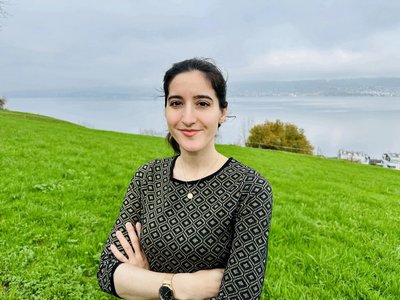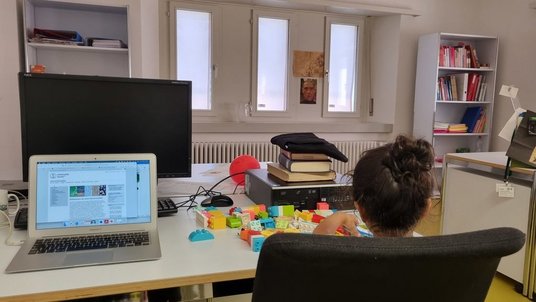

Motivation and Choice of Research Institutions
The Marietta Blau Fellowship enabled me to extend my dissertation research beyond Austria and to align the mobility requirements of an academic career with the realities of family life. Both locations offered excellent conditions for research and networking. Zurich, with its unique dual chair in Islamic Studies and Gender Studies, provided valuable insights into addressing interdisciplinary questions, while Freiburg enriched my research with its broad thematic scope and diverse academic perspectives.
Main Objectives and Outcomes of My Stay
The primary objective of my research stay was to investigate how gender relations and gender as an epistemological category are reflected in the field of Islamic Studies at German-speaking universities. Through interdisciplinary conferences, workshops, an international graduate course, and inter-university doctoral colloquia, I was able to expand my research network and conduct interviews with experts from various universities. This significantly enhanced the scope and representativeness of my research. The networking opportunities and the quality of academic discussions in Zurich and Freiburg enriched my project, allowing me to present my research at the host institutions and establish lasting connections that are currently being developed into future projects

Support from Partner Institutions
The support from the partner institutions was essential, as visiting researchers do not automatically have the same resources and access rights as regular staff. Having a fully equipped workspace, inclusion in institute events, a personal digital identity with an email account for communication, and access to university infrastructure such as intranet, research databases, and affordable childcare—aligned with the unique circumstances of frequent travel between university sites in three countries—allowed me to integrate into the research environment and pursue my work effectively.
Personal Insights and Experiences
My research stays were impactful both professionally and personally. The Alpine landscape surrounding Zurich and the relaxed atmosphere in Freiburg provided not only new experiences but also a high quality of life. I became more familiar with the neighboring regions of Austria and learned a great deal about the varying academic practices within the German-speaking world. The Swiss location, in particular, posed certain challenges for visiting researchers, especially due to high living costs—the poverty threshold for an individual as defined by the Swiss Federal Statistical Office in 2022 was CHF 2,284 (approx. EUR 2,300) per month—and stringent rental contract requirements (e.g., character references), often involving long termination periods (1 year) and additional costs, such as mandatory name labeling. Regarding compulsory health insurance, there is an option for exemption for those staying for research purposes. Thanks to the support of colleagues on site, hurdles such as the housing search were made easier with recommendation letters and advocacy with property management, allowing me to focus on my work.

Future Plans
The research stays exceeded my expectations in terms of supervision, academic exchange, and networking. The Marietta Blau Fellowship provided me with valuable international experience and opened doors for future collaborations. As a result, I am able to continue my research stays in Zurich and Freiburg and benefit from the institutional resources available there. These experiences have also had a significant impact on our family life and have led to the consideration of staying in Switzerland for the longer term. At the same time, the experiences gained through the fellowship have made it clear that the conditions—not only, but especially for early-career researchers with caregiving responsibilities—require extensive family and institutional support. I particularly appreciated the OeAD feedback loops, which allowed me to communicate both positive experiences and practical challenges from the fellowship, as these often go beyond initial expectations and set criteria.
Curriculum Vitae
Dominique Bauer has conducted a research stay in Switzerland and Germany in the academic year 2021/22 with the Marietta Blau fellowship. She is a member of the Vienna Doctoral School of Social Sciences at the University of Vienna and a visiting researcher at the Institute of Asian and Oriental Studies at the University of Zürich and the Oriental Seminar at the Albert Ludwig University of Freiburg. Since 2023, she has been co-editor of the Yearbook of Muslims in Europe. Her research focuses on gender relations in academia as well as migration and identity politics in Europe.
Recent Publications
- (with Daniela Paredes Grijalva): When good intentions aren’t enough: Intersectional invisibilities in academia and the decolonial turn. GENDER – Zeitschrift für Geschlecht, Kultur und Gesellschaft, 16/3: 15 Years of GENDER – An Assessment of the Situation (October 2024), pp. 216-229. Budrich Journals. doi.org/10.3224/gender.v16i3.15
- (with Astrid Mattes): Austria (Vol. 15). In: Alibašić, A., Akgönül, S., Müssig, S., Nielsen, J. & Račius, E. (eds.), Yearbook of Muslims in Europe, Leiden: Brill, pp. 41-63. (March 2024), doi.org/10.1163/2588-9737_YMEO_COM_152022AUT
